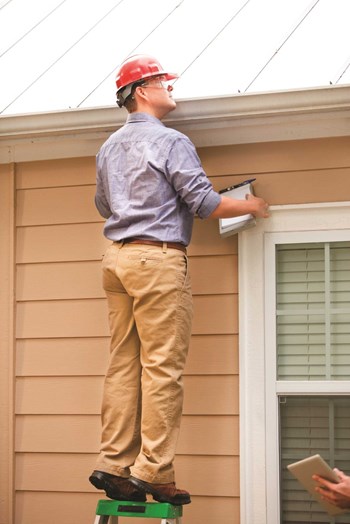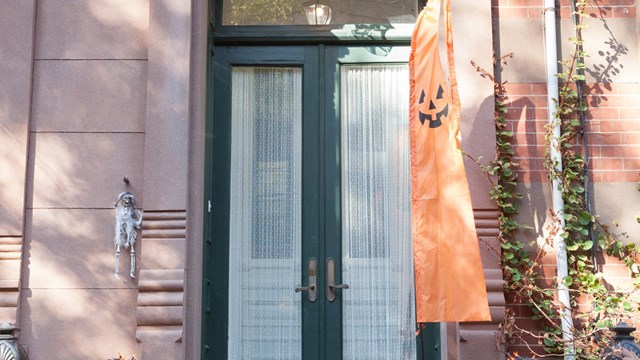
When it comes to keeping the exterior surfaces of a co-op, condo or HOA well-maintained and free of any potentially dangerous structural issues, it’s up to the management company and board to take steps to insure the safety of residents and visitors alike. After all, a chunk of loose concrete on a high-rise can be life-threatening to anyone who walks by on the sidewalk. Loose bricks gone unnoticed just a flight or two from street level can cause an alarming level of damage.
That’s why periodically, the exterior of multifamily buildings should undergo inspection by an engineer or other qualified professional. The purpose of such inspections is twofold: they're a way to check for cracks, settling, and other signs of serious damage, and they also can give boards and managers vital information about the condition of their property that in turn helps them plan their budgets to allow for future maintenance needs.
Make it Routine
The requirements of facade inspections vary depending on what municipality the building is in. In New Jersey, the Department of Community Affairs (DCA) runs housing inspections every few years to make sure exteriors, as well as common spaces, are up to code. “If the DCA inspects your building and finds you in violation, they give you a time limit to get an estimate and repairs done, otherwise they can impose a fine,” says Brian Bolger, owner of Magnolia Development, LLC in Succasunna. Beyond that, there are no other state maintenance requirements. New Jersey expects associations to handle ongoing upkeep on their own.
Facade materials, weather conditions, and the age of the building in question will affect what inspectors are looking for when they analyze an exterior, but property managers should follow an established protocol to make sure corners aren't cut, and any deterioration isn't missed. “After the winter's over, property managers should bring in one of their general construction contractors—someone familiar with the entire building envelopes,” says Bolger. “The contractor will do a walk-around each of the buildings and inspect all the key areas to make sure there's isn't any water penetration. This doesn't involve the removal of any stucco or brick; if they notice a problem, they'll make a note of the area, and put it on their spring project list.”
Generally, inspectors look for deflections, cracking and delamination in concrete framing, corrosion or deterioration of any steel or wood frame components, and evidence of water intrusion. They also may observe issues with windows, shutters, screen framing, accessories, piping systems in garages, and roofing systems where applicable (usually in associations in suburban areas). An inspection should also identify any cracks, spalling or rebar corrosion in masonry walls/balconies. And, additionally, roofs, floors, windows and exterior finishes are evaluated for deficiencies or any damages that may affect the safety and stability of the building or buildings.
Reducing Risks
It's important to know what the signs of deterioration are in the various materials used in a given facade—particularly in spots where different materials meet. “If you have wood sheeting, it will actually deteriorate the metal sheeting,” says Lynn Voorhees, RS, RCS, director of Community Association Services at DW Smith Associates in Farmingdale. “And then anything that's attached to it is compromised. If you don't have kick-out flashing installed on a stucco wall, you may have infiltration where the roof comes down and ends at a gutter. Water will infiltrate down behind the stucco of the wall and deteriorate the wood sheeting. When it gives, there's nothing holding the wire stucco mesh to the wall anymore, and the stucco will start to bulge away.”
The inspection not only points out signs of ordinary wear and tear, but also those things that present structural or safety problems require immediate attention. “If it's a high-rise building and the facade has started to deteriorate, that's actually a liability to the association,” says Voorhees. “Because if concrete or masonry chunks start falling, they could easily cause harm. So, you're looking at two things here: one is degradation of the structural integrity of the building, and the other one is the risk of physical harm.”
Within the association itself, the board has the latitude to determine to some degree when inspections and repairs are carried out. While every state-sanctioned inspection has to be completed by the end of the year, some boards may want to time the inspection so it's not performed right after the exterior had just been painted, for example.
In urban centers, more high-rise housing stock comes with different facade-related challenges, from elaborate 19th century limestone buildings to brand new steel-and-concrete structures. For new developments, an inspection of the exterior and other components should be performed as soon as possible after turnover of control from the developer, in order to identify any significant construction defects and protect potential construction defect claims.
Facade inspections for older buildings aren't much different from those for newer ones; however facades built over 70 years ago can feature a lot more architectural detail. “The only particular challenge a historical building may have is getting up close to them,” says Rhocel Bon, an associate at Klein and Hoffman, an engineering firm, which has offices in Philadelphia and Chicago. “A lot of the historical buildings are more ornate in nature, and rigging them up for scaffolding is a little bit more challenging and costly.”
Once the inspection is completed, older buildings may have to deal with more strict controls on how repairs are done. “When it comes to repairs, older buildings have to replace the materials with the appropriate material. If the terracotta needs repair, you have to use terracotta,” says Bon.
There is no cut-and-dried list of observations that can be used to determine if a facade problem is serious. A crack found on the exterior of the building can result in all sorts of consequences, depending on the location, configuration, width, and type. One crack might just be a cosmetic issue—or it could signify an emergency. Buildings with elevated recreation decks, balconies, parking garages or other structures can be very complicated. Buildings can have water intrusion problems without structural problems, structural problems with minimal water intrusion problems, or both. The level of detail and knowledge required is why it's necessary to have a qualified, state-recognized inspector on the job.
“Anything that may involve a structural component, or may actually allow water infiltration into the building facade, and therefore affect the structural integrity of the structure, is something that a professional should always be brought in for,” says Voorhees.
Once an inspection is done, it’s important that the engineer or inspector codify and communicate his or her findings to the board/manager of the property clearly so they know what they need to do. As soon as the community's administration has the inspector’s findings in hand, engineers recommend that any structural problems are fixed expediently. “Once any issues with the exterior are identified, the contractor would then assemble a cost-to-cure, to rectify any issues on that building,” says Bolger.
So whether your community is a waterfront high-rise, an historic building in the heart of downtown Jersey City or a sprawling suburban development in the Skylands region, be sure to take a good, hard look at your exterior surfaces at least once a year, and more often, if possible. It’s not only part of every board /management team's duties but crucial to keeping your property safe, and on the right side of the law.
Keith Loria is a freelance writer and a frequent contributor to The New Jersey Cooperator. Staff writer Tom Lisi also contributed to this article.






Leave a Comment